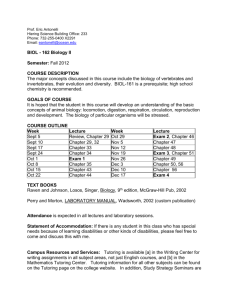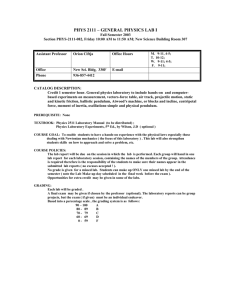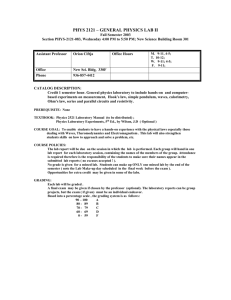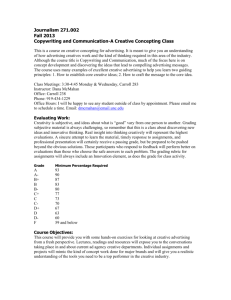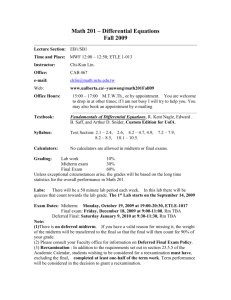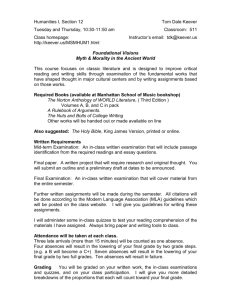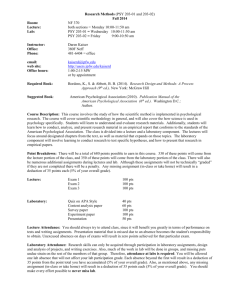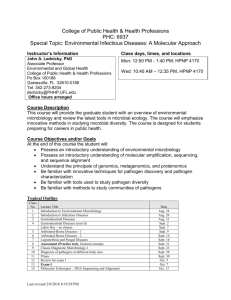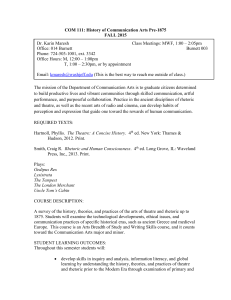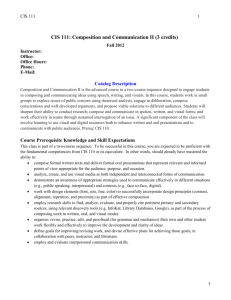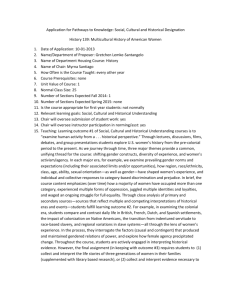CSCI 451: Computational Biology
advertisement
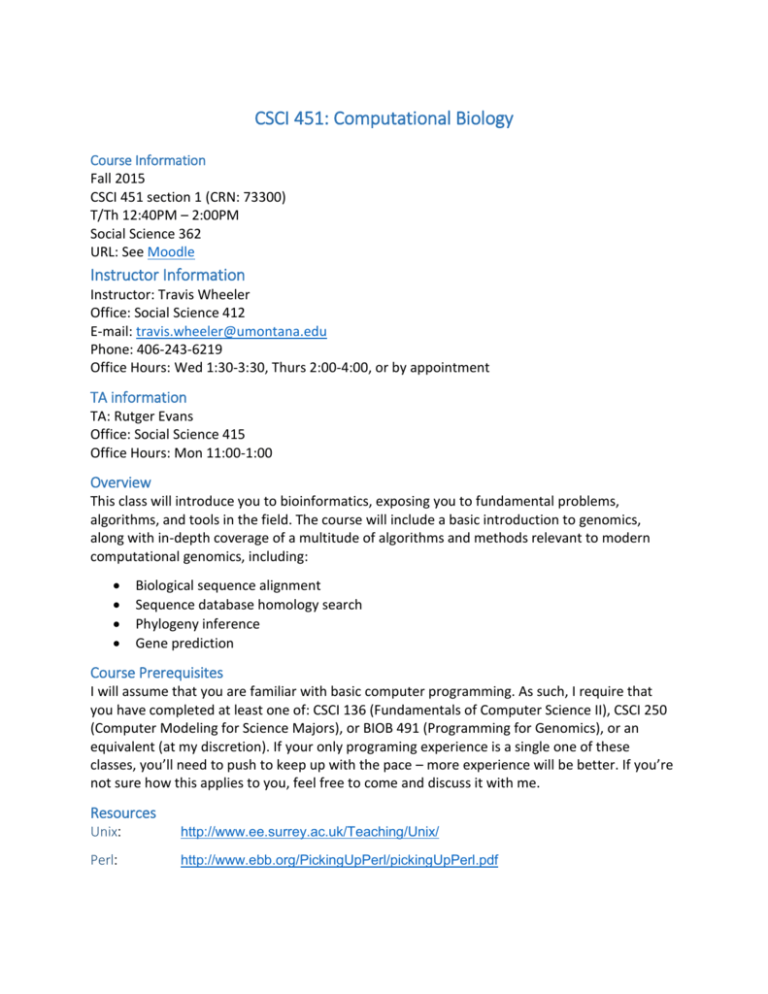
CSCI 451: Computational Biology Course Information Fall 2015 CSCI 451 section 1 (CRN: 73300) T/Th 12:40PM – 2:00PM Social Science 362 URL: See Moodle Instructor Information Instructor: Travis Wheeler Office: Social Science 412 E-mail: travis.wheeler@umontana.edu Phone: 406-243-6219 Office Hours: Wed 1:30-3:30, Thurs 2:00-4:00, or by appointment TA information TA: Rutger Evans Office: Social Science 415 Office Hours: Mon 11:00-1:00 Overview This class will introduce you to bioinformatics, exposing you to fundamental problems, algorithms, and tools in the field. The course will include a basic introduction to genomics, along with in-depth coverage of a multitude of algorithms and methods relevant to modern computational genomics, including: Biological sequence alignment Sequence database homology search Phylogeny inference Gene prediction Course Prerequisites I will assume that you are familiar with basic computer programming. As such, I require that you have completed at least one of: CSCI 136 (Fundamentals of Computer Science II), CSCI 250 (Computer Modeling for Science Majors), or BIOB 491 (Programming for Genomics), or an equivalent (at my discretion). If your only programing experience is a single one of these classes, you’ll need to push to keep up with the pace – more experience will be better. If you’re not sure how this applies to you, feel free to come and discuss it with me. Resources Unix: http://www.ee.surrey.ac.uk/Teaching/Unix/ Perl: http://www.ebb.org/PickingUpPerl/pickingUpPerl.pdf Python: http://learnpythonthehardway.org/book/, https://www.coursera.org/course/programming1 Required textbook DEKM: “Biological Sequence Analysis: Probabilistic Models of Proteins and Nucleic Acids”. Richard Durbin, Sean Eddy, Anders Krogh, and Graeme Mitchison (ISBN: 0-521-62971-3) JP: “An Introduction to Bioinformatics Algorithms”. Neil C. Jones and Pavel A. Pevzner (ISBN: 0262-10106-8) Approximate Schedule Week Aug 31 – Sept 4 Sept 7 – Sept 11 Sept 14 – Sept 18 Sept 21 – Sept 25 Sept 28 – Oct 2 Oct 5 – Oct 9 Oct 12 – Oct 16 Oct 19 – Oct 23 Oct 26 – Oct 30 Nov 2 – Nov 6 Nov 9 – Nov 13 Nov 16 – Nov 20 Nov 23 – Nov 25 Nov 30 – Dec 4 Dec 7 – Dec 11 Content Intro Algorithm overview; Prob. Theory overview Pairwise sequence alignment Homology search Text indexes, suffix trees, read mapping Hidden Markov models HMMs (cont), exam Profile HMMs, project Profile HMMs (cont), project Multiple sequence alignment Clustering, phylogeny Phylogeny, project Exam, Thanksgiving Space efficient DP, Gene prediction Project (TBD = to be determined) Reading JP 1,3 (by Th) JP 2 (by T) DEKM 1 (by Th) DEKM 2 TBD JP 9 DEKM 3 (part) DEKM 3 (remainder) DEKM 5 (part) DEKM 5 (remainder) TBD JP 10 TBD JP 7, TBD Project You are welcome to propose any topic that you find interesting. I will help establish appropriate scope. I am happy to supply suggestions for topics; this will be best achieved in a visit to my office. Undergraduate Students You will identify a topic in the field of bioinformatics or computational biology, and write a short paper describing that topic (background, application, existing methods). This is akin to the Introduction section of a scholarly article. Graduate students You will develop a bioinformatics method or perform research with actual biological data (or both), with a significant programming component. The project will be performed in four major parts: (1) a proposal, (2) a preliminary paper (in sections), (3) the final paper, and (4) a conference-style presentation of your work. You may work individually or in groups. Grading (tentative) Undergraduates: Exams / Quizzes: 35% Class Participation: 15% Homework Assignments: 35% Project: 15% Graduates: Exams / Quizzes: 25% Class Participation: 15% Homework Assignments: 25% Project: 35% Late policy: Late homework and assignments will be penalized 10% for each 24 hours that the assignment/homework is late, up to a maximum penalty of 50%. I view this as a very lenient policy, designed to allow you to get partial credit even assignments are late Final Exam: There will be no final exam. Collaboration Discussion of problems and programs is OK if you acknowledge and describe the discussion when you turn in the assignment. You must write your own programs and assignments, and you must understand what you turn in. I reserve the right to ask any student to explain what he/she has done, and to adjust the grade assigned on the basis of this explanation. Attendance Attendance is not recorded, so there are no direct rewards or penalties for attending or not attending, outside of class participation grades. That said, students are expected to understand material presented in class, and be aware of, complete, and submit all assignments on time. Assignments will be made regularly and are due regularly, so students who attend regularly will see some advantage, and students who fail to attend regularly will see some disadvantage. Students who miss class because of “unavoidable circumstance” should contact me ASAP afterwards to seek “relief”. Students who know in advance they will miss a class due to prior commitment, unavoidable circumstance, religious observance, or other special circumstance should contact me prior to the class in question to seek relief. In accord with UM policy, students participating in an officially sanctioned, scheduled University extracurricular activity will be given appropriate relief. Dates for exams will be announced several days in advance. Attendance at exams is mandatory unless arrangements are made with the instructor in advance. Additional Course Guidelines and Policies: Incompletes and Late Drops I will strictly follow University policy. In for me to consider an incomplete or late drop or change to audit status, you will have to submit documentation (such as a note from a doctor) to verify your reason for the incomplete or late drop. The acceptable reasons for a late drop are limited to: registration errors, accident or illness, family emergency, and change in employment schedule. See pages 20 and 21 of the catalog for the University policies. Student Conduct Code Disability Modifications (H3) The University of Montana assures equal access to instruction through collaboration between students with disabilities, instructors, and Disability Services for Students. If you think you may have a disability adversely affecting your academic performance, and you have not already registered with Disability Services, please contact Disability Services in Lommasson Center 154 or call (406) 243-2243. I will work with you and Disability Services to provide an appropriate modification. Policy on E-Device Use During Class. Students are welcome to use laptops, tablets, or other e-devices to take notes, refer to materials, or whatever, as long as this use doesn’t create noise or other potential distractions. Students are not welcome to have e-devices “sound off” during class (please set them on vibrate or equivalent) and students are not welcome to answer calls verbally or otherwise generate noise in class. If you know that you have an important call you might have to take during class, tell me ahead of time, sit near the exit, and when your phone vibrates wait until you are out in the hallway to answer.





